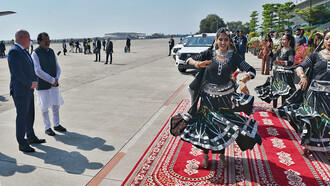Recently, we have heard and read many testimonies about Pope Francis's ability to listen openly and intensely to his callers and to be near the poor, the disadvantaged, and the common man. He could communicate with those of all faiths. He fought tirelessly against war and injustice. He cared for his neighbors and gave us hope. Injustice need not triumph, he would say. He was on everybody’s level, even with a friendly joke.
I agree with all of this characterization of the extraordinary Pope Francis. However, many commentators forget one of his most essential and yet bothersome contributions, Laudato si’, also known as “On Care for Our Common Home.” It is the first encyclical in the history of the Roman Catholic Church to be devoted entirely to the issue of the environment. Indeed, in its treatment of care for the Earth as a moral issue, it is a landmark religious document.
“In the words of this beautiful canticle, Saint Francis of Assisi reminds us that our common home is like a sister with whom we share our life and the beautiful mother who opens her arms to embrace us.
This sister now cries out to us because of the harm we have inflicted on her by our irresponsible use and abuse of the goods with which God has endowed her. We have come to see ourselves as her lords and masters, entitled to plunder her at will. The violence present in our hearts, wounded by sin, is also reflected in the symptoms of sickness evident in the soil, in the water, in the air, and in all forms of life. This is why the earth herself, burdened and laid waste, is among the most abandoned and maltreated of our poor; she “groans in travail” (Rom 8:22). We have forgotten that we ourselves are dust of the earth (cf. Gen 2:7); our very bodies are made up of her elements, we breathe her air, and we receive life and refreshment from her waters”1.
I wish to explore the moral implications of this sister with whom “we have come to see ourselves as her lords and masters, entitled to plunder her at will. The violence is present in our hearts, and we are wounded by sin.” That is to say, in blunt words, those who do not respect our sister, the environment, are sinners. The fossil fuel industry, particularly its leaders who lied for decades about the climate impact of their products, are sinners. Those who continue to violate nature, our god-given planet, are committing a sinful, immoral act. Pope Francis would not have said it that way. He would have asked you if it was not better to refrain from this. He would listen to your response.
This is the Laudato Sì that we tend to forget.
Okay, you're not Catholic, so this is not a sin. You belong to another religion, and you must check if destroying the planet is permitted. You may be agnostic, and it's only a moral issue, or maybe not even that. One may ignore the matter or be indifferent. However, remember you are ignoring it for your children and grandchildren.
And be warned, the evidence is accumulating that even for you, the present middle-aged generation, the outcome will be problematic. Costs for weather- and climate-related disasters are increasing nonlinearly, including in the US. With the current low level of investment in climate mitigation, the probability of irreversible climate events increases significantly. Take your choice: increased coral bleaching, the permafrost thaw contributing to orange rivers with reduced fish abundance and drinking water quality, or catastrophic warming of at least 2.5°C by the end of the century. Labor productivity, even in advanced economies, will deteriorate significantly. Climate change could eventually contribute to societal collapse, which researchers are increasingly considering.
According to the Independent High-Level Expert Group on Climate Finance2, the highest investment level for 2030 is about 6.7 trillion dollars per year for keeping within the objectives of the Paris Agreement. This amounts to about two percent of the global wealth of households with more than USD 100,000 3. This is an affordable investment and could be viewed best as an insurance policy for avoiding the worst. These rich, including myself, are collectively behaving immorally. Or they are being indifferent or stupid.
And Pope Francis was not patient with the inadequate political response to climate change. “ It is remarkable how weak international political responses have been. The failure of global summits on the environment makes it plain that our politics are subject to technology and finance. There are too many special interests, and economic interests easily end up trumping the common good and manipulating information so that their own plans will not be affected. The Aparecida Document urges that “the interests of economic groups that irrationally demolish sources of life should not prevail in dealing with natural resources”.
The alliance between the economy and technology ends up sidelining anything unrelated to its immediate interests. Consequently, the most one can expect is superficial rhetoric, sporadic acts of philanthropy, and perfunctory expressions of concern for the environment, whereas any genuine attempt by groups within society to introduce change is viewed as a nuisance based on romantic illusions or an obstacle to be circumvented”1.
The most important achievement of Laudato Sì is presenting the compelling necessity for caring for the Earth as a moral issue.
You will enjoy exploring Laudato Sì's seven goals: responding to the cry of the earth, responding to the cry of the poor, ecological economics, adoption of sustainable lifestyles, ecological education, ecological spirituality, community resilience, and empowerment. It is a wonderful read.
References
1 Pope Francis (2015), Laudato Sì.
2 Bhattacharya A, Songwe V, Soubeyran E, and Stern N. (2024) Raising Ambition and Accelerating Delivery of Climate Finance. London: Grantham Research Institute on Climate Change and the Environment, London School of Economics and Political Science.
3 Mebane, W. (2025), Climate goals, global wealth, and green bonds.















